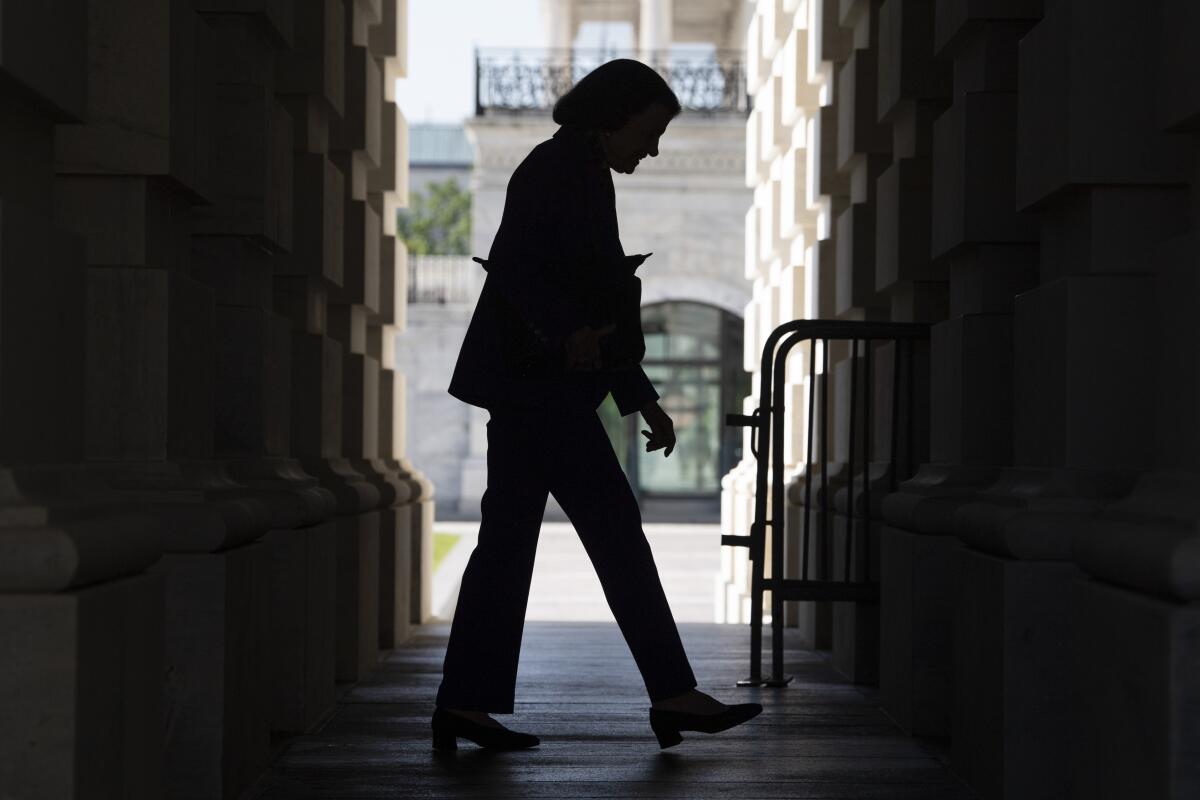Opinion: How to fill Dianne Feinstein’s seat if she resigns? The Constitution offers a clear answer

- Share via
With pressure mounting on Sen. Dianne Feinstein to resign before the end of her term, it’s important to understand what the Constitution requires if or when that happens. The short answer: an election.
Even if Feinstein resigns soon, however, California law doesn’t require a vote to fill the vacancy until the next general election, more than a year and a half from now. The state can serve the Constitution and the voters better by holding a special election in the near term.
In the event of a vacancy in the Senate, both the 17th Amendment to the Constitution and California election law permit Gov. Gavin Newsom to make a temporary appointment to fill the seat — much as he did in appointing Alex Padilla to the state’s other Senate seat. But the Constitution also requires an election allowing the people of California to decide who will serve the remainder of the unexpired term. If Feinstein does decide to vacate her seat, California should heed that constitutional and democratic imperative by calling a special election as soon as practically possible.
U.S. senators haven’t always been elected. For the first century and a half of this country’s history, they were selected by state legislatures. That changed during the Progressive Era, when pressure to democratize American government led to the adoption of the 17th Amendment, which took effect in 1913.
Elections are the 17th Amendment’s focus. It commands that the people directly elect their U.S. senators to six-year terms.
Of course, sometimes senators will leave office before their terms expire. Prior to the 17th Amendment’s ratification, such vacancies were traditionally filled by gubernatorial appointment. The 17th Amendment did not entirely eliminate gubernatorial appointments; instead, it says a state legislature may authorize a governor to appoint a temporary replacement until the state holds an election to fill the seat.
These two features of the amendment — appointment and election — can work together to promote democratic values. Although appointees are not chosen by voters, they do ensure that the people of a state will not be without full representation. They can also counteract antidemocratic aspects of the political process by empowering underrepresented communities.
For example, nine of the first 13 women to serve in the Senate arrived as gubernatorial appointees. The first, Rebecca Latimer Felton of Georgia, was appointed by a governor looking for political cover after opposing women’s suffrage. And two of the earliest elected female senators had previously served as appointees.
Despite these advantages, the amendment is clear on the point that they are only temporary and that states must hold elections to fill every vacancy in the Senate. Elections are the 17th Amendment’s lodestar.
That’s not to say that the states always follow this constitutional requirement. In studying more than 200 vacancies since 1913, we found that states have failed to hold a vacancy-filling election in roughly one-sixth of cases.
When Illinois Gov. Rod Blagojevich attempted to sell the Senate seat Barack Obama left to become president, state law would have allowed his appointed replacement to complete the term without an election. It took a lawsuit in federal court to force Illinois to comply with the Constitution and hold an election to fill the vacancy.
Even when states formally comply with the election requirement, we found that many dragged their feet, needlessly delaying the opportunity for voters to weigh in. Since 1913, more than 60 Senate vacancies have lasted longer than a year before an election was held. Indeed, California’s Padilla, whom Newsom appointed when Kamala Harris left her seat to become vice president, served almost two years as an unelected appointee before winning a vacancy-filling election last fall. That was when the state held a special election to fill the last couple of months of Harris’ term concurrently with the general election for the next six-year term.
All told, since ratification of the 17th Amendment, temporary appointments have deprived the American people of a total of more than 200 years of elected representation.
That brings us back to Feinstein. The people of California are entitled to directly elect two U.S. senators. If another of those senators leaves office, the governor should use his legal authority to ensure that the people are represented by an appointee in the short term, and he should consider using his appointment power to expand the diversity of political representation in the Senate.
But even the most praiseworthy appointee should not be allowed to hold the office for months on end without an election. The Constitution would mandate an election to fill Feinstein’s term, and the state should hold one expeditiously.
If Feinstein resigns, Newsom should work with the Legislature to schedule a special election according to the letter and spirit of the Constitution. While turnout tends to be lower in special elections, modern efforts to make voting easier — including early voting, mail-in ballots and automatic registration — can mitigate that problem.
Pairing any appointment with a speedy special election would be the best way to honor Feinstein’s long career in elective office and our democratic values. It’s also what the Constitution requires.
Zachary Clopton is a professor at Northwestern University’s Pritzker School of Law. Steve Art is a civil rights attorney at Loevy & Loevy.
More to Read
A cure for the common opinion
Get thought-provoking perspectives with our weekly newsletter.
You may occasionally receive promotional content from the Los Angeles Times.










